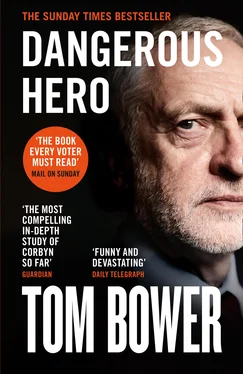‘I’ve got all these debts,’ Jeremy Corbyn told his long-time friend Reg Race. ‘Can you work out why?’
‘I don’t need to be a genius to tell him what’s wrong,’ Race thought. ‘He’s in danger of bankruptcy.’ But at first he said nothing. Sitting in the Spartan living room of Corbyn’s semi-detached house in north London, Race picked up a single sheet of paper and read out the politician’s financial death warrant. Across from him sat his host and Claudia Bracchitta, Corbyn’s formidable Chilean wife. They had positioned themselves unnaturally far apart from each other.
Claudia had summoned Race as a mutual friend to solve their differences. Blending his expertise in both Marx and Mammon had won him the trust of the Corbyns. As Corbyn’s close political ally on the far left for many years, Race, a former MP, had transformed himself in recent times from a political agitator into a successful financial consultant in Britain’s health business.
The papers in front of him showed that the Corbyns owed their bank £30,000, the equivalent today of twice that figure. Several personal loans had been guaranteed by Corbyn’s income as an MP. He was also burdened by high mortgage repayments. As a last resort, the bank could threaten to recover its money by seizing his home. ‘You’ve run out of loans,’ said Race. Unchecked, within five years the debts would amount to £100,000. Corbyn’s annual salary was £43,000.
Claudia interrupted. This was entirely the result of her husband’s folly, she said. She and their three sons had little money even to buy food and clothes. ‘We can’t afford a decent life.’
The principal cause of the debts was the Red Rose Community Centre on the Seven Sisters Road in Holloway, north London. Situated in the heart of Corbyn’s constituency, the Red Rose was a bar and dance area on the ground floor of the building that fulfilled his commitment to open his party office in the constituency. Corbyn was paying its rent and some of its staff’s salaries out of his own pocket. Simultaneously, he owed a large sum to the Inland Revenue for his employees’ unpaid National Insurance and pension contributions. The financial chaos was matched by his style of management. His employees complained about being both undervalued and underpaid. Among the casualties was Liz Phillipson, his battle-scarred assistant, who had resigned rather than continue to tolerate Corbyn’s fecklessness.
‘You haven’t got enough money for what you’re doing,’ Race said bluntly. ‘You should close your office in Holloway and move to the Commons. That would cut your costs by 80 per cent.’
‘I won’t,’ replied Corbyn.
‘Oh, come on, Jeremy, you know he’s right,’ Claudia said, her voice rising. ‘Why don’t you believe him?’
Corbyn mumbled, then fell silent. His body language showed that he felt no inclination to follow Race’s recommendations. Claudia was becoming noticeably agitated. ‘It was clear a breakdown was coming,’ thought Race.
He was not surprised by the tension. Corbyn had first met his ‘utterly lovely’ wife (she had an athletic figure and a characterful face) in 1987, and soon after they decided to marry. An intellectual with a deep understanding of South America, Claudia had bonded with him at a protest meeting against Chile’s military dictatorship, addressed by Ken Livingstone. ‘She wanted to get off with me,’ Livingstone would recall, ‘but I had to go off to meet Kate, my partner, so she went for Jeremy.’ In the flush of romance and clearly infatuated, Claudia had not grasped that while her future husband’s enthusiasm for making jam or turning wood on a lathe was appealing, his lack of interest in material things meant that he ignored her need for comfort. At one stage she had planned for them and their young sons to move from Islington to leafy Kingston-upon-Thames, but was quickly disabused of the idea. ‘He has to live in his constituency,’ Keith Veness, another close political friend, informed her. ‘No one told me,’ she sighed.
Long before the onset of their financial problems, life with Corbyn had proved difficult. Tony Banks, the Labour MP for Newham North-West, witnessed just how difficult as one day he walked into Westminster’s central lobby and spotted Claudia standing by the wall, tearfully holding her children. Jeremy, she explained, had promised to meet her two hours earlier. He had not turned up. Banks took the four Corbyns to the Commons family room and went off in search. Eventually he found Corbyn in a committee room. ‘You’d better come out and look after your children,’ he suggested. Corbyn did not seem fazed for a moment. Banks was not surprised. ‘When pushed to have a day off,’ he recalled, ‘Jeremy’s idea was to take his partner to Highgate Cemetery and study the grave of Karl Marx.’
Reg Race had experienced something similar when he had invited the Corbyn family for a week’s holiday at his country home in Derbyshire. On the day, Claudia arrived with the children.
‘Where’s Jeremy?’ asked Mandy, Reg’s wife.
‘I don’t know,’ replied Claudia with sadness. ‘He just told me “I’ve got to go to a meeting,” and I haven’t seen him since.’
Over the following thirty-six hours, Claudia called several numbers searching for her husband. Two days later he turned up, explaining his absence as a necessary sacrifice for ‘the movement’. At the time, Race decided that Corbyn was absent-minded rather than neglectful. But a huge question about his attitude towards his responsibilities remained unanswered.
Shortly after, Keith Veness and his wife Val confronted the same thoughtlessness. Claudia, who had come from a middle-class family used to a certain degree of comfort, was always complaining about the shortage of money.
‘I’ve told Jeremy that he should stop being an MP and get a well-paid job,’ she confided.
‘What can Jeremy do to earn more money?’ Veness asked.
Val added, ‘The miners get much less than Jeremy.’ But Claudia, she realised, did not appreciate her husband’s hair-shirt lifestyle. She had even wanted a cleaner, but Corbyn had vetoed that. Did Claudia have bourgeois tendencies, Val wondered.
None of Corbyn’s constituents could have imagined the tension when he arrived at meetings with his family to speak about Ireland, a subject of no interest to Claudia. By contrast, he had a self-proclaimed (if questionable) passion for Arsenal Football Club. Claudia was worried about hooliganism at the team’s home matches at Highbury, while Corbyn, according to Keith Veness, regarded the game as ‘crude and awful’, and much preferred not to go. So Veness took Corbyn’s sons to matches, while their father went to political meetings.
‘Jeremy wasn’t interested in football,’ recalled Veness, contradicting Corbyn’s boast of passionate support for Arsenal. ‘Except, that was, on Cup final day.’
By late 1996 the marriage was all but over, and with nothing left in common, the two had drifted apart. To Corbyn, Claudia’s list of complaints was familiar. Ever since 1967, when he had met Andrea Davies, his first girlfriend, at the Telford Young Socialists, a succession of women had made the same observations: he never changed his ways, and he rarely thought about them. Throughout the years he wore the same shabby clothes, ate the same bland food and stuck to the same political convictions he had begun to absorb in Jamaica, where he had spent fifteen months as a teenager in the 1960s. Admirers hailed his inflexibility as proof of his uncompromising principles, and to some the purity of his other-worldliness was endearing. Detractors blamed his limited intelligence and lack of education for his failure to appreciate others. On his own account, amid a constant round of demonstrations, speeches and political manoeuvres, he claimed to avoid causing any personal insult. Further, to avoid criticising any of his partners, he would insist that politics was about ideas, not personalities.
Читать дальше










